| HOMEPAGE | CONTENTS | CITYSCOPE |
FEATURES 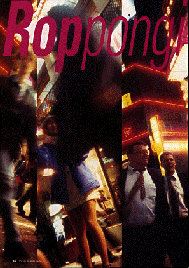 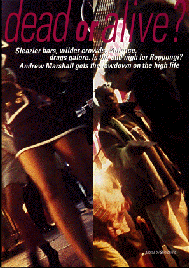 |
||
| HOMEPAGE | CONTENTS | CITYSCOPE |
FEATURES   |
||
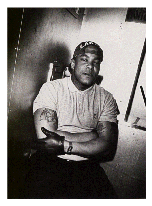 Kevin the barman barman flicks a fingernail-size roach off the counter
and waits. It's 9pm. Old Milwaukee, like most Roppongi bars, has more staff
than customers.
Kevin the barman barman flicks a fingernail-size roach off the counter
and waits. It's 9pm. Old Milwaukee, like most Roppongi bars, has more staff
than customers.Outside the Miami coffee shop, the hostesses from One Eyed Jack shove leaflets in their pockets and pour back across Roppongi Crossing in a sea of blonde. Three policemen follow in cold pursuit.
Tim's standing near Seishido bookstore, handing out Casino Pharaoh cards on autopilot. The police arrested the last guy, but Tim's okay because Aussies get working holiday visas. He's only been in trouble with the law once, but he says he learned his lesson: Don't ride a bicycle when you've got a pair of chain cutters in the basket.
Tomas is standing opposite McDonald's, leafleting for Rock Inn for Y1000 an hour. He says he'd never be doing this shit job back in Germany.
The hostesses from Sei Reve flank the sidewalk opposite the Defense Agency. One of them shouts: Why don't you come in for a drunk? She starts laughing: I mean, for a drink--hey, come back, that was a joke.
The whole of Roppongi is out on the streets, hustling for business.
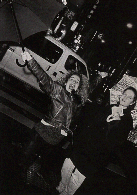
And less money. The days when fantastic bar receipts from Mogambo were known in accounting departments at head offices in every G7 capital are gone, along with most of the bankers and brokers who filed them. Clubs are dropping their cover charges to attract fewer customers with thinner wallets. These days, with a bit of creative bar-hopping, you can drink yourself to death on dusk-to-dawn happy hours.
The old establishments have grown shabby and the new ones have the life expectancy of a 7-Eleven sandwich. Roppongi's sleaze factor, which was always high, has multiplied. On some nights, the place feels less like part of a buttoned-up Tokyo and more like Patpong Road, except without the ping pong balls. "The girls coming down here are getting younger and younger," says Burt the barman. "They have no sense. People are fucking in the bathrooms. Shit, I have to clean up all the condoms after work--if they use condoms."
Greased by cheap booze and ready drugs, the Roppongi rumor mill churns out tales of stabbings, beatings, brawls and a rape in the toilet of a well-known local bar. "Roppongi was once considered like a classy place to go," says a TV producer. "Now it's real down and dirty. Almost every time I go there I almost get into a fight, and I'm like a pacifist guy. It's the place for people who don't know any better. It's the last choice. It's the place of default."
Detractors will say: So what's new? But the multinational millions who work and play there every year are now asking the question: Is Roppongi dead or alive?
TUESDAY.
Roppongi is no longer the preserve of white gaijin and Japanese. Motown is swimming with nouveau riche Iranians and Iraqis. The entrance to Java Jive is clogged with young Japanese-Brazilian. The Colombians, Peruvians and Venezuelans fill new(ish) clubs like Salsa Sudada and Salsa Caribe. Ghanaians working in Tokyo's African boutiques and restaurants meet up by McDonald's to shoot the breeze at the weekend. And if you're carrying a leaflet from any Roppongi establishment, chances are a Nigerian has handed it to you.
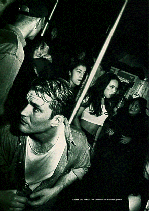 All this would be good and beautiful, if the melting pot wasn't showing signs
of boiling over. In February, a bottle was lobbed at a squad car as police
tried to break up a 20-minute brawl between Japanese and Japanese-Brazilian
kids. Last November, Japanese-Brazilians battled Peruvians with wooden clubs
after one Brazilian broke all the windows of a Toyota pick-up. Late last year
an African street vendor reportedly pulled a gun on a Japanese who punctured
the tires on his van. And in February, African-American sailors beat the son
of a Ghanaian diplomat senseless after an argument over a girl. No one was
arrested in any of these cases.
All this would be good and beautiful, if the melting pot wasn't showing signs
of boiling over. In February, a bottle was lobbed at a squad car as police
tried to break up a 20-minute brawl between Japanese and Japanese-Brazilian
kids. Last November, Japanese-Brazilians battled Peruvians with wooden clubs
after one Brazilian broke all the windows of a Toyota pick-up. Late last year
an African street vendor reportedly pulled a gun on a Japanese who punctured
the tires on his van. And in February, African-American sailors beat the son
of a Ghanaian diplomat senseless after an argument over a girl. No one was
arrested in any of these cases.
The last fight started in Vietti in the Square Building, a club with possibly the worst reputation in the area. According to Roppongi lore, the DJ there once announced, "Please don't rape the girls on the dance floor." Vietti is dominated by Africans and African-Americans, and there's little love lost between the two groups.
"There were fights all the time," says a barman who used to work there. "One night a guy got stabbed in the stomach. Another guy slashed this guy's face with a knife, so the guy broke a bottle over his head. They were both lying outside, completely floored. I left 'cos I couldn't stand that shit anymore."
"My staff saw a guy being beaten up in the elevator as they were taking the rubbish out," says the owner of a popular restaurant nearby. "In the morning we have to clean up the blood, sometimes condoms. One morning we found a drunk sleeping there." The restaurateur says his business is suffering because families are reluctant to venture near there.
The owner of Vietti declined to be interviewed. "The police have asked me not to talk to the press," he says. The club has reportedly become the main target of occasional Roppongi-wide midnight visits by police. Vietti's notoriety hasn't seemed to dent its popularity. The place is mobbed at the weekend and on its week-day ladies' night.
Africans, particularly Nigerians, also dominate Roppongi's streets in a way they didn't several years ago. Mr. T's office is the sidewalk outside Bikkuri Sushi. He's been here for 14 years; he's got a gaijin card and the meishi of a yakuza from the Kobayashi gang. "You carry this, man, and no one can fucking touch you," he says. His friend, Mr. Red, has been here for 18 years. He wears a tracksuit and two thick gold necklaces, and carries two Snickers-sized cellular phones. He offers the keys to a nearby Merc, just to prove it's his.
Nigeria is globally renowned for producing some of the world's most accomplished scam artists. In March, according to anti-fraud agents at a major credit card company, Narita customs officers stopped a Nigerian who was carrying 39 phony credit cards. This has raised fears further that credit-happy Japan has been targeted by Nigerian conmen.
Mr. T says he's clean. "We do straight business," he says. He won't say exactly what it is but his fellow Nigerian, who won't give his name, offers a clue. "Petroleum, man," he whispers. "You give me Y5 million and I can make you fifteen million in 24 hours." Why would anyone give Y5 million to a man standing in a raincoat outside a sushi shop? "My father's the Nigerian Minister for Petroleum," he says.
WEDNESDAY
The U.S. Naval Criminal Investigative Service (NCIS) says that Roppongi has always been subject to periodic curfews. It is still investigating the near-fatal beating of the African outside Vietti, and says the number of incidents in Roppongi involving military has stayed pretty much constant--a claim many workers in the area agree with. But some U.S. sailors report a heavier NCIS presence on Roppongi's streets and most are more than aware that an ugly reputation precedes them.
Michael, Jonathan and Terry are unarmed, sober and deep in enemy territory. Based in Hawaii but training at Camp Fuji, the three marines are staying at the Hotel New Sanno and partying in Roppongi for the first time. They're not monosyllabic meathead stereotypes, but small, well-spoken guys who say things like "The marines is tough but rewarding," and mean it. They're 20 years old and they missed the Gulf War and now they're fighting the Battle of Roppongi.
"There's a prejudice against us in Roppongi," says Jonathan. "You can feel it in the air."
"The Japanese don't like the military, period," says Michael. "They have a bad feeling about us 'cos we dropped two atomic bombs on them."
"If I was Japanese and lived in a small town where two or three thousand foreigners came on a rampage every weekend, drinkin' and pickin' up women, I might have a little bit of an attitude, too," says Terry.
"A lot of places like Gas Panic won't serve us 'cos the military have been involved in something there," says Michael. "I don't think it's just the military who are responsible for the violence, but it just takes one marine to make a mistake, and that's it for the rest of us."
"It's a shame, 'cos Roppongi's very cosmopolitan and if the military aren't here that's a big slice of the cake missin'," says Jonathan.
"It's the whole round-eyed barbarian thing," says Terry. "Some people look at you with interest, some people look at you with disgust. In the Bronx, though, they could be lookin' at you with a gun."
"Our CO told us to watch out for the Iranians," says Michael. "He said they might try to kick our ass."
"And we haven't done anything to them since the Iran-Iraq war," says Terry.
"Our CO said that we could only come to Tokyo if we took a room at the Sanno," says Michael. "Last night all my buddies came back with stories about the women in their rooms. I was too drunk. I drank a bottle of Jim Beam and passed out."
"Tonight's the night, though," says Jonathan.
"Yeah, tonight we're on a mission," says Terry.
THURSDAY
Some say Seventh Heaven will help turn Roppongi into a Kabukicho-like flesh zone. Others says it's the best thing since T-backs. The large sign outside features two sculpted rears in gilded frames mooning the Defense Agency across the road. The interior has two stages, a mirrored ceiling, curvaceous black walls with pink beaded lighting and high-backed velvet chairs in gynecological shades of pink and purple. Total cost: a million dollars plus--an investment which suggests immense faith in Roppongi's recuperative powers. Mr. Gondo, the Hiroshi Kume lookalike who owns One Eyed Jack and Seventh Heaven, is reportedly planning to open yet another club.
"Anyone who says Roppongi is dead is thinking too much," says Mikey, Seventh Heaven's manager. As the manager of One Eyed Jack, Roppongi's first mass production gaijin hostess bar, he watched countless other bars try to mimic its early success. In early 1995 alone, at least three gaijin hostess bars have opened in Roppongi. "I guarantee Seventh Heaven will have copycats," Mikey says.
Seventh Heaven is better value than J-Foxx, racier than Flamingo, classier than Hips (the hostess bar where One Eyed Jack girls go when they die), and makes the all-Japanese entertainment at the Channel 9 "lingerie and kissing bar" across the road seem like a knit-in at a nunnery. For the usual hole in a Y10,000 note, you can sip expensive drinks and watch topless dancing. For Y5000, you can even take a Polaroid. To see the rest, you have to pay an as-yet undecided fee for a "chair dance"--Seventh Heaven's secret weapon. Ti offers to show me one on the house.
"Now," she says, grabbing the handles on either side of my high-backed chair, "I'm allowed to touch you but you're not allowed to touch me." She peels the swimsuit off her shoulders and there it is: a lightly scented, perfectly chiseled cleavage--the cutting edge of Roppongi nightlife. Then she writhes and smiles and chats about how Japanese men prefer blondes and how all the women are living in a temple a 40-minute bus ride away, which is totally far out, even though there's no heating or running water, and no monks.
After five soft-core minutes, Ti readjusts her one-piece and flashes a
centerfold smile. "So that's a chair dance," she says. "It's kind of like a
geisha concept."
Kind of.
FRIDAY
There's been another fight, this time between the Brazilians and Japanese at Java Jive.
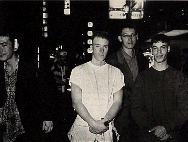 So last December Avextrax spent over Y4 billion to build the cavernous
Velfarre disco in the throbbing heart of Roppongi. You wonder why they
bothered. It costs around Y5000 to walk up Velfarre's grand entrance
stairway, and only then if you're dressed right--that's suits for men, sober OL
style for women, and absolutely no jeans, unless you're deemed cool, in which
case you're in. The elevators have wacky sci-fi sound and light effects. The
dance floor is the size of a shopping mall. At peak time (9pm, Friday) it is
packed with a restrained crowd of well-dressed twentysomethings.
So last December Avextrax spent over Y4 billion to build the cavernous
Velfarre disco in the throbbing heart of Roppongi. You wonder why they
bothered. It costs around Y5000 to walk up Velfarre's grand entrance
stairway, and only then if you're dressed right--that's suits for men, sober OL
style for women, and absolutely no jeans, unless you're deemed cool, in which
case you're in. The elevators have wacky sci-fi sound and light effects. The
dance floor is the size of a shopping mall. At peak time (9pm, Friday) it is
packed with a restrained crowd of well-dressed twentysomethings.
And you look at it all and think: Juliana's was vulgar and stupid, but at least it could be fun. The chances of "Velfarre's Girl" becoming a media buzzword are slim.
Many Roppongi club owners say Velfarre is a turkey that will be stuffed by Christmas. They say Roppongi needs new ideas, not just cash. "I went out last weekend and Roppongi was dead," says Szenana, a club owner. "There was nothing. I like to dance, y'know? But Lexington Queen is the same, Java Jive is the same, Buzz is the same." Szenana recently started the club Shocking near Roppongi Crossing to stop the rot.
Philip is putting his efforts into a new Saturday club called Pylon in Aoyama. He has partied and staged events in Roppongi for ten years, and can remember the area's tonier days. "The clubs there used to be packed out every night. A lot of Japanese I know say Roppongi is scary now. I'm from L.A. L.A. is scary. Roppongi is not. But you go to the Square Building and there are people lying face down on the ground. It's not very high class."
Philip believes Roppongi is also partly a victim of the internationalization of other parts of Tokyo. Many clubbers prefer the mellower global ambiance of leafy Aoyama--and places like Apollo, Blue, Maniac Love, Shinkukan--and only venture into Roppongi's fringes at dawn when after-hours raves begin at Geoid on TV Asahi-dori and the Breakfast Club on Roppongi-dori. "The upscale crowd has moved on, or else they don't go out at all," says Philip. "The trend of Roppongi is sort of fading away."
SATURDAY
The one Roppongi trend that is not dying, but growing, is drug use. "It really shocked me," says Garret the psychologist. "Two years ago it was just grass. Now it's all hard drugs. There was one in here last week. I said to him, `Do you mind if I ask you a personal question? Are your pupils usually that big?'"
"E is free-flowing," says Burt, a small-time dealer. "It's the drug of choice 'cos it costs four or five thousand a hit and it keeps you fucked up for hours. Coke is Y15,000 a gram. If you know someone, you can get it cheaper. But for us poor, snivelly, just-wanna-get-fucked-up people, E's the thing." Burt was sacked from a popular bar for dealing Ecstasy and acid. He's down on his luck just now, but can still get you what you want from barman at several other equally well-known bars.
Roppongi is a vast pharmacy. With one trip to the phone booth of a big-name bar, one rumor goes, a gram of coke will be delivered quicker than a Domino's Deluxe. "The bathrooms in these bars are treated like the personal offices of certain dealers," says John. "I'm always walking in on deals. Or you'll be wanting to take a leak but there's a couple in there doing drugs. The next couple that go in will have sex. The next couple will have sex and drugs. You'll go to the back of the bar and there'll be people cutting lines of coke off CD cases. Or you'll be working and there'll be this incredible smell of hash. Everyone's so nonchalant about it."
Roppongi's ever-growing, easy-going reputation as a druggies' paradise is reportedly attracting increasing numbers of young Japanese. But, says another barman, "Most of the people on drugs are the ones working here." You only need to yawn for someone to offer "a little pick-me-up," says John. "You'll know a barman who's really lazy most of the time. Then suddenly you'll see him cleaning every goddamn thing in the place."
For many hostesses and other staff, drugs are considered a necessary antidote to the boredom and exhaustion of all-week graveyard shifts. "A friend of mine was so wasted once that she needed half a speed just to get the energy to eat lunch," laughs an Israeli hostess called Karen. John reckons drug use is exacerbating the already-high burn-out rate of Roppongi staff, rather than slowing it down; his bar has had 30 employees in the last five months. "You'll see a guy that looks really fucked up, like a hard-core user. But three months before, he was the straightest guy you'd ever have seen. Hey, we changed that! Or someone will head for Bali to detox for a few months. You won't recognize them when they come back."
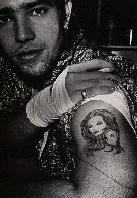 Official drug statistics show that half of those arrested on drugs charges in
Japan are now non-Japanese. With their late opening hours and youthful,
international crowds, areas like Roppongi and Azabu are considered drug
hotspots by the authorities. But how this scrutiny translates at street level
is hard to fathom.
Official drug statistics show that half of those arrested on drugs charges in
Japan are now non-Japanese. With their late opening hours and youthful,
international crowds, areas like Roppongi and Azabu are considered drug
hotspots by the authorities. But how this scrutiny translates at street level
is hard to fathom.
"I heard a story of the police scraping resin out of this guy's hash pipe," says Jeffrey at 51-50. "He got eight months hard labor. If someone gets caught with something now, the police throw the book at them." John disagrees. He recalls the time the police arrived at the Flower after-hours club, turned on the lights, found whoever they were looking for, and left again. "Shit! Did they know what they almost had there? There wasn't a person in there who wasn't on something. I reckon the police do much less than they know they could." Says Tess, a former hostess: "By six on a Sunday morning, I'd say 95 percent of Roppongi is high on either coke or speed, and I never heard of even one of them getting arrested."
Ninety-five percent is almost certainly an exaggeration, but Tess is almost right about the arrests. Pop quiz: How many people of any nationality were charged by law enforcement agencies in 1994 for possessing or dealing Ecstasy, not just in Roppongi but across the entire country? Answer: Two.
IS ROPPONGI DEAD or alive? The streets have got meaner,
the drugs harder and
cheaper, the crowds younger and poorer, and the bars grungier. But many people
who work or go out there believe reports of Roppongi's death are greatly
exaggerated. The area is not in terminal decline, it's in transition; it's not
dead, just thinking.
"There will always be a need for Roppongi," says Jeffrey. "Where else would all the foreigners go?" Although Tokyo Metropolitan Police won't comment on Roppongi, one guesses they think the same way. The gaijin have got to work and play somewhere; best keep them in one place where they're easier to watch.
"Roppongi's still got the reputation," says the TV producer. "It's still possible to walk into a place and pick up a girl in ten minutes. You gotta be a little bit warped to hang out in some of those places full time, but if you're just into quantity rather than quality, it's probably one of the best places in the world."
"There's no place like it," says Tess. "It's very friendly, because everyone is linked by the fact that they're in a foreign country. It's like a big family."
"Roppongi isn't dying anymore than anywhere else in Tokyo," says Mikey. "The dollar is weak. It's a slow time."
"It's the slow season, man," says the wild-eyed barman at Déjà Vu. "You wait till summer. The whole place is gonna explode."
SUNDAY
Then comes dawn, then the Tokyo crows, then a rush hour of the bleary and the weary and the wasted. Every guy's got a girl, and every girl's got a guy. Nobody got killed by Aum.